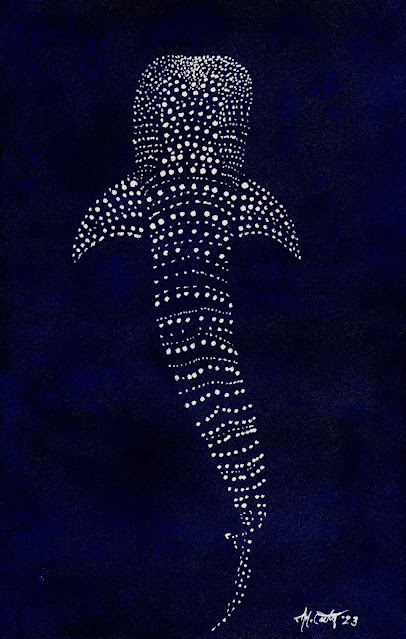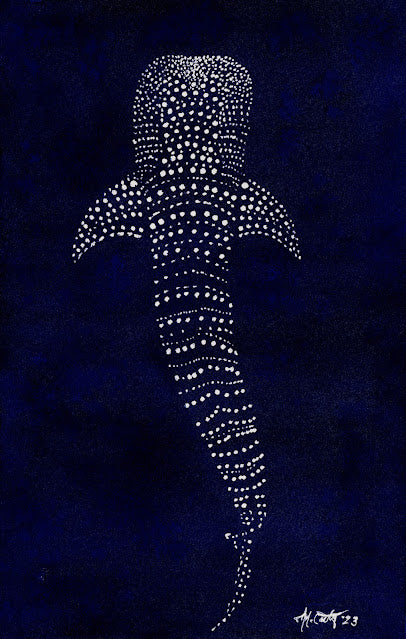Hey friend,
Each winter, we try to take a trip somewhere warm to break up the long cold of winter. Two weeks ago, we were in Panama trying to catch whale sharks and eagle rays on their migration down the Pacific Coast. Unfortunately, they were over 3 weeks late because climate change is altering the timing of warm currents that their food source (krill) travel on. Though we tried, we didn't see them.
 |
| "Whale Shark Fingerprint" by Jenny McCarty |
In the delicate dance of life on Earth, humans play a pivotal role as stewards of the environment. Yet, our actions have led to a crisis of unprecedented proportions, with ecosystems unraveling, species disappearing, and climate patterns shifting. Now, more than ever, the planet needs us to embrace sustainability as a guiding principle for our collective future.
The urgency of the situation cannot be overstated. Our planet is facing a myriad of interconnected environmental challenges, from deforestation and pollution to loss of biodiversity and climate change. These issues are not abstract concepts relegated to distant futures; they are unfolding before our eyes, impacting ecosystems, communities, our planned vacations, and future generations.
At the heart of the matter lies the unsustainable consumption and exploitation of natural resources. Our current patterns of production and consumption are pushing planetary boundaries to their limits, depleting finite resources, and exacerbating environmental degradation. If left unchecked, these trends will have profound and irreversible consequences for life on Earth.
The art world is not immune or innocent from these harmful impacts. Many art manufacturers and artists use papers and canvases from critical old-growth forests, paint brushes made from animal fur, paints full of toxic chemicals and plastic, and package art in unsustainable materials and plastics. They also ship heavy art all over the world, adding to greenhouse gas emissions. There's a better way.
Sustainability offers a lifeline—a path towards a more equitable, resilient, and harmonious relationship with the planet. By embracing sustainable practices, we can reduce our ecological footprint, conserve resources, and mitigate the impacts of climate change. From reducing our consumption and the distance art travels, to choosing more ecofriendly art materials, there are countless ways in which artists and art consumers can contribute to a more sustainable future.
Moreover, sustainability is not just an environmental imperative; it is also a matter of social justice and equity. The most vulnerable communities are often the hardest hit by environmental degradation and climate change, exacerbating existing inequalities and injustices. For instance, the beaches in Panama were covered in plastic and trash produced by the U.S. and Mexico and carried on those same life-giving warm currents that bring krill, whale sharks, and eagle rays. How do you think all that plastic impacts the local ecosystems, and thereby communities? By prioritizing sustainability, we can build more inclusive and resilient societies that prioritize the well-being of all people and the planet.
 |
| Trash on Tortuga Cay, Panama. Most beaches are like this beyond the sand break. |
At Sage Leaf Studio, we’re committed to reducing our environmental impact and promoting sustainable practices in the art community. We use eco-friendly materials whenever possible, we recycle and reuse materials to minimize waste, and we contribute 10% of sales to nonprofit wildlife conservation organizations. We also encourage other artists to adopt sustainable practices by sharing our experiences and knowledge. Learn more about our sustainable art practice and how you can incorporate more sustainable practices into your love for art here.

